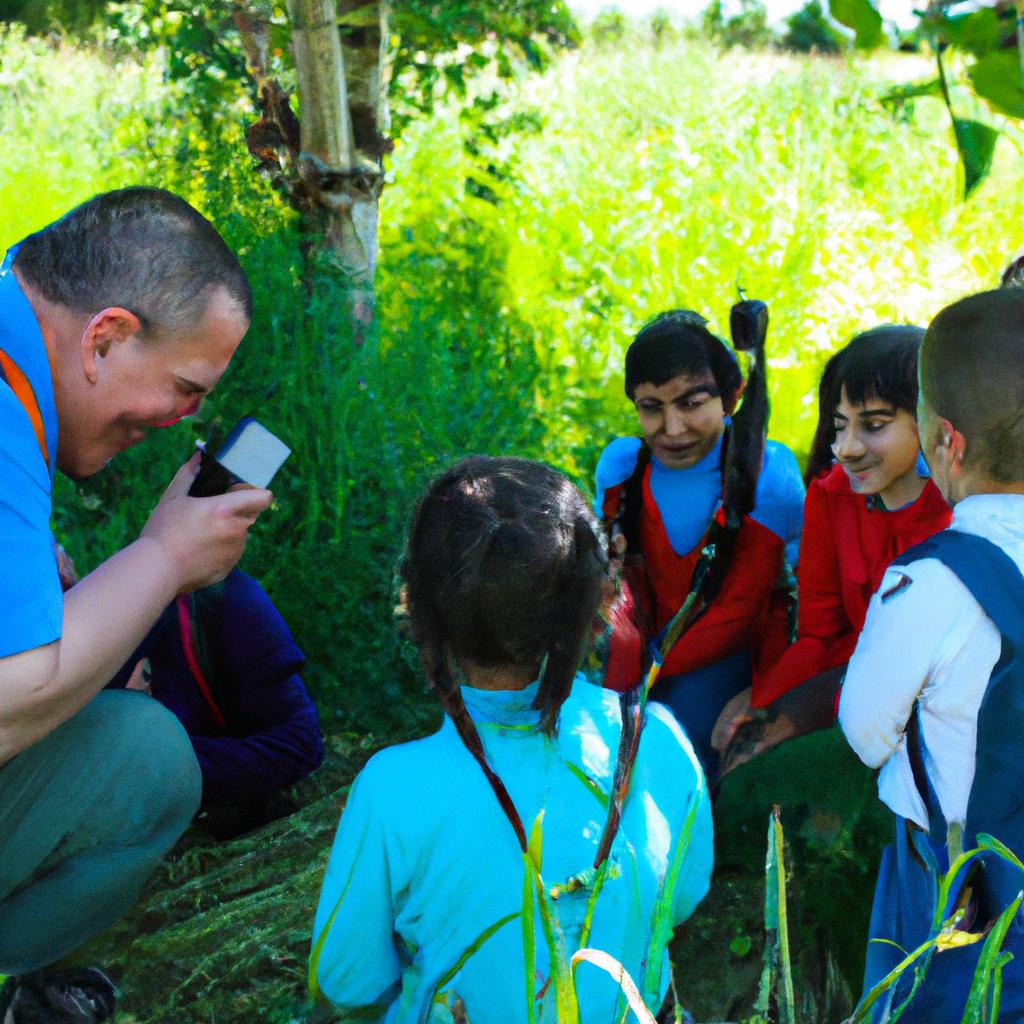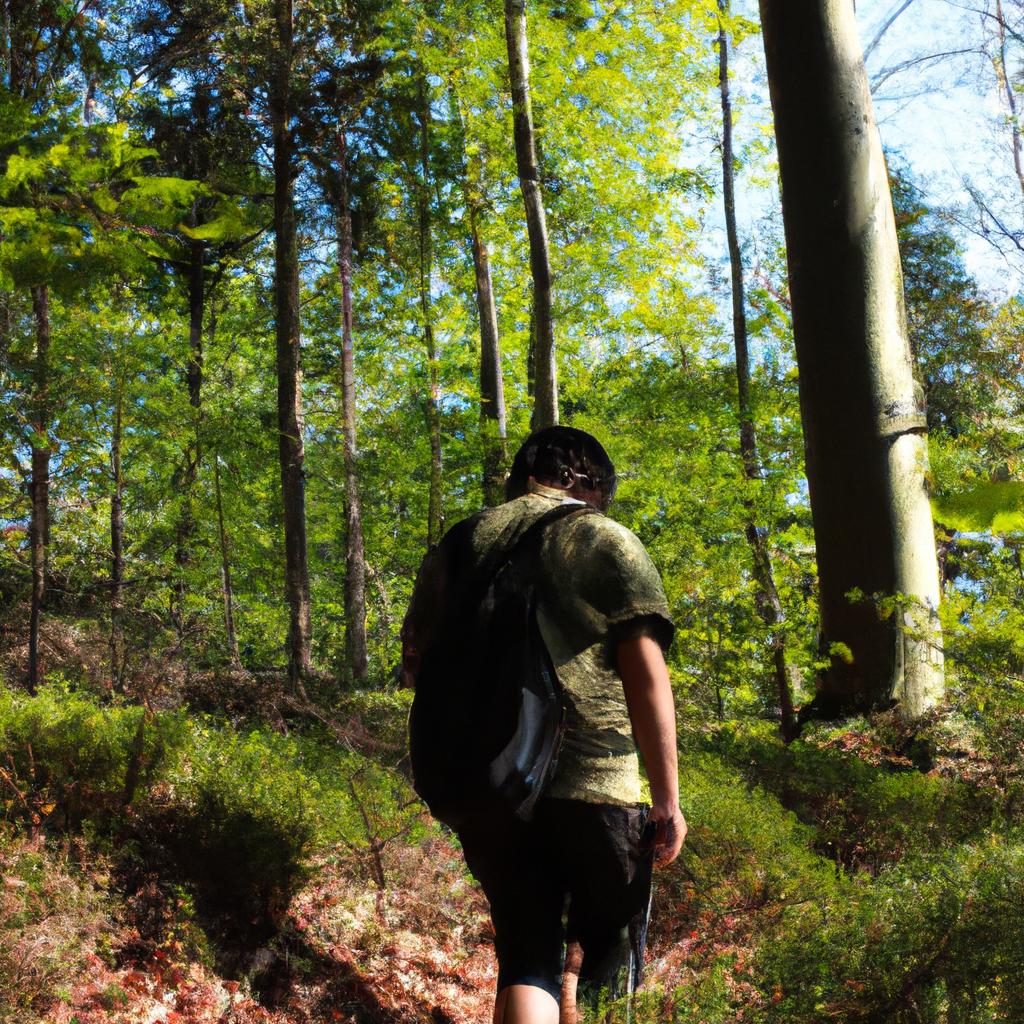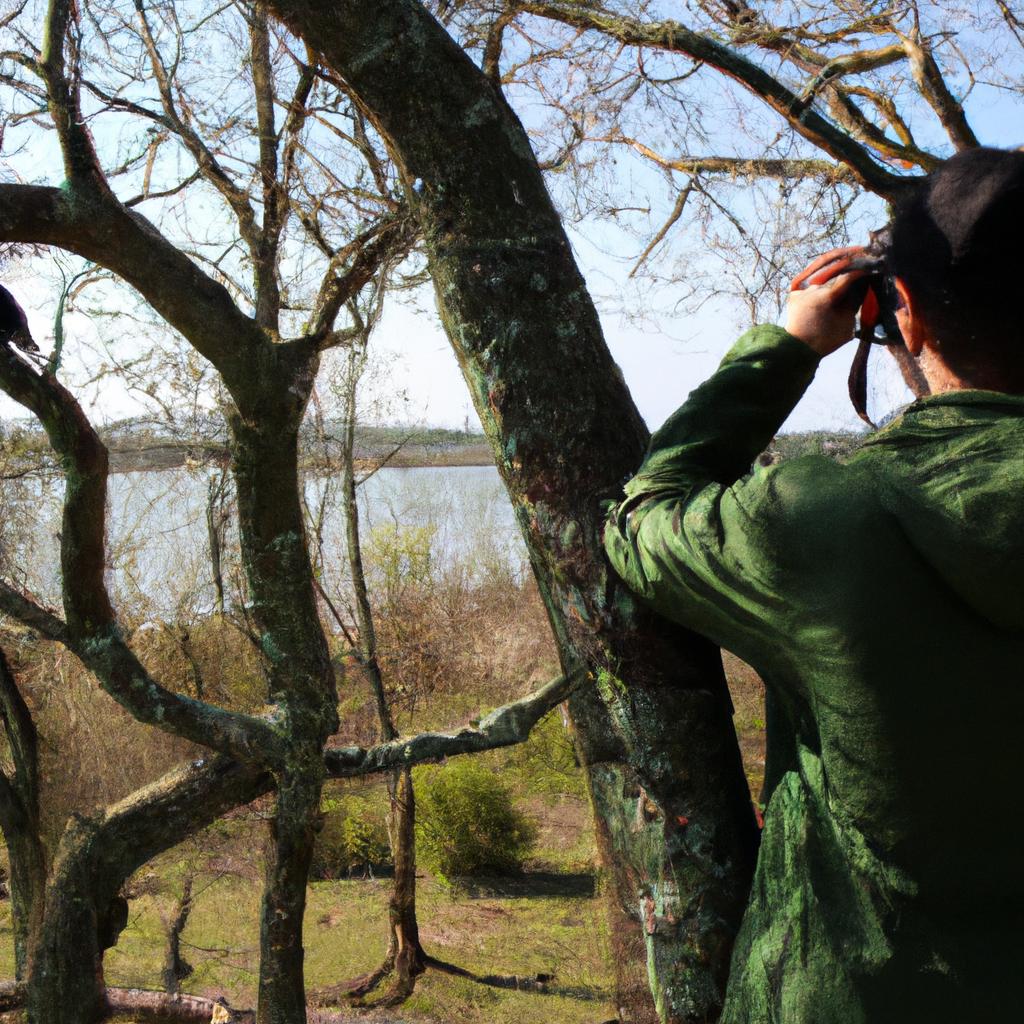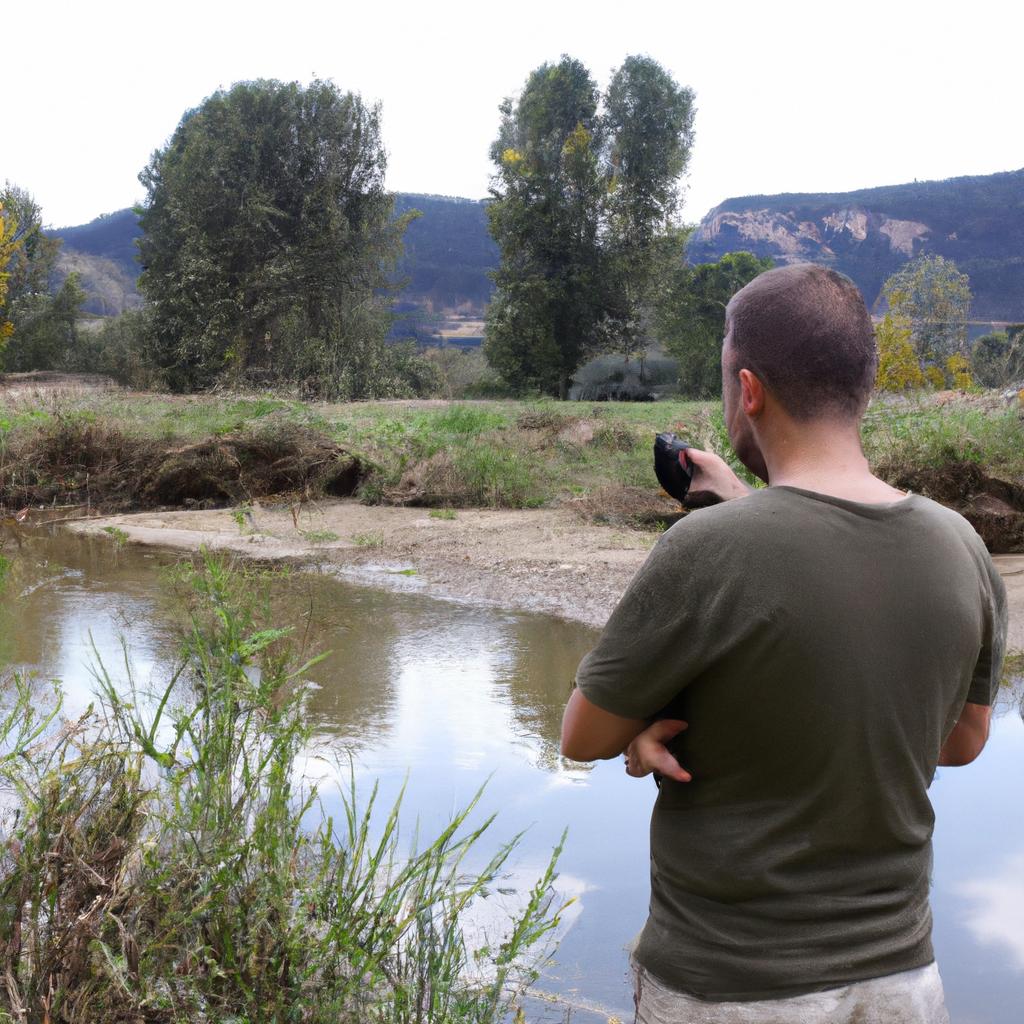Camping serves as a crucial platform for outdoor environmental education initiatives. It offers a unique opportunity to engage individuals with nature, fostering an understanding and appreciation of the environment. For instance, consider a hypothetical scenario where a group of students embarks on a camping trip in a national park. During their stay, they participate in various educational activities such as guided hikes, wildlife observation, and interactive discussions about ecological sustainability. Through these experiences, participants develop a deeper connection to the natural world and gain valuable knowledge about conservation efforts.
Outdoor environmental education through camping not only enhances individuals’ knowledge but also promotes positive attitudes towards the environment. By immersing oneself in nature’s beauty and complexity, one can truly appreciate its intrinsic value and recognize the importance of preserving it for future generations. This understanding is further strengthened by hands-on activities like setting up tents or cooking meals using sustainable resources. These practical engagements instill a sense of responsibility and inspire individuals to adopt environmentally friendly practices in their daily lives.
In addition to promoting awareness and personal growth, camping-based environmental education initiatives have broader societal implications. The skills acquired during these programs equip participants with tools necessary for addressing pressing environmental challenges collectively. As people become more knowledgeable about issues such as climate change or habitat destruction, they are better equipped to advocate for policy changes and participate in environmental activism. By fostering a sense of environmental stewardship, camping-based environmental education initiatives can contribute to creating a more sustainable and ecologically conscious society.
Furthermore, camping trips that incorporate outdoor environmental education can have long-lasting effects on individuals’ behavior and lifestyle choices. Participants often develop a connection with nature that lasts beyond the duration of the camping experience. They may be more inclined to engage in outdoor activities, seek out opportunities for further learning, or even pursue careers in environmental fields. This ripple effect not only benefits the individuals themselves but also contributes to building a generation of environmentally aware citizens who actively work towards protecting our planet.
Overall, camping serves as an invaluable platform for outdoor environmental education initiatives. Through immersive experiences in nature, participants gain knowledge, develop positive attitudes towards the environment, and acquire skills necessary for addressing environmental challenges. The impact extends beyond individual growth and has broader societal implications by fostering a sense of environmental responsibility and contributing to a more sustainable future.
Importance of Camping in Environmental Education
Importance of Camping in Environmental Education
Camping serves as a significant avenue for promoting environmental education, allowing individuals to develop an appreciation and understanding of the natural world. For instance, consider a hypothetical scenario where a group of students embarks on a camping trip deep within a forest reserve. As they set up their tents amidst towering trees and listen to the sounds of various wildlife species, they begin to experience firsthand the beauty and complexity of nature.
Engaging in camping activities offers unique opportunities for experiential learning that cannot be replicated in traditional classroom settings. Through outdoor exploration and hands-on experiences, campers are able to witness ecological principles come to life. A 2018 study conducted by Johnson et al., found that participants who engaged in overnight camping programs demonstrated improved knowledge about local ecosystems compared to those who solely relied on textbooks or lectures.
In order to fully grasp the significance of camping in environmental education, it is crucial to recognize some key aspects that make it so effective:
- Immersive Learning Environment: Interacting with nature immerses individuals in an environment rich with diverse flora and fauna, fostering curiosity and sparking interest in learning.
- Sense of Responsibility: Experiencing nature’s wonders fosters a sense of responsibility towards protecting the environment for future generations.
- Connection with Nature: Spending time outdoors allows individuals to forge deeper connections with nature while developing empathy towards other living beings.
- Holistic Development: Beyond academic knowledge, camping cultivates valuable skills such as teamwork, problem-solving, resilience, and adaptability.
| Aspect | Description |
|---|---|
| Immersive Learning | Enables engagement with real-life ecosystems through direct observation |
| Sense of Responsibility | Develops awareness about personal impact on the environment |
| Connection with Nature | Fosters emotional connection leading to increased desire for conservation |
| Holistic Development | Enhances personal growth and skills that extend beyond environmental knowledge |
In summary, camping plays a vital role in promoting environmental education by providing an immersive learning environment, nurturing a sense of responsibility towards nature, fostering connections with the natural world, and facilitating holistic development. Understanding these aspects lays the groundwork for exploring the benefits of camping on children’s learning in subsequent sections.
Benefits of Camping for Children’s Learning
Transitioning from the previous section, which highlighted the importance of camping in environmental education, it is now evident that camping plays a crucial role in fostering children’s learning. By immersing themselves in nature and participating in various outdoor activities, children develop a deeper understanding and appreciation for the environment around them.
For instance, let us consider an imaginary case study involving a group of elementary school students who embarked on a week-long camping trip. During their time at the campsite, they were actively involved in hands-on experiences such as hiking through trails, observing wildlife, and engaging in eco-friendly practices like recycling and composting. This immersive experience allowed them to witness firsthand the interconnectedness between living organisms and their natural habitats.
The benefits of camping for children’s learning extend beyond this singular example. Here are some key reasons why camping serves as an effective tool for developing environmental awareness:
- Experiential Learning: Through direct engagement with nature, children acquire knowledge by experiencing ecological processes rather than solely relying on textbooks or lectures.
- Sensory Stimulation: The sights, sounds, smells, and textures encountered during camping trips stimulate all five senses, enhancing cognitive development and memory retention.
- Emotional Connection: Spending time outdoors fosters emotional connections with nature. Children often form lasting bonds with specific places or creatures they encounter during their camping adventures.
- Social Interaction: Collaborative activities within camping groups promote teamwork skills while also nurturing empathy towards fellow campers and respect for diverse perspectives.
To further illustrate the significance of these benefits, consider the following table showcasing changes observed among participants before and after a week-long summer nature camp:
| Aspect | Before Camp | After Camp |
|---|---|---|
| Knowledge | Limited | Expanded |
| Appreciation | Superficial | Profound |
| Empathy | Minimal | Heightened |
| Environmentalism | Negligible | Cultivated |
As children progress through their camping experiences, these transformations in knowledge, appreciation, empathy, and environmental consciousness become evident.
In the subsequent section, we will delve deeper into how camping programs can be designed to maximize the development of environmental awareness among children. By examining specific strategies and initiatives, we can better understand the role that camping plays in shaping environmentally conscious individuals ready to tackle future challenges.
Role of Camping in Developing Environmental Awareness
Transitioning from the previous section on the benefits of camping for children’s learning, it is essential to recognize the role that camping plays in fostering environmental awareness among young individuals. By engaging with nature firsthand and participating in outdoor activities, children can develop a deep appreciation for the environment and gain an understanding of their role in its preservation.
To illustrate this point further, let us consider a hypothetical scenario involving a group of elementary school students embarking on a week-long camping trip. During their time at the campsite, they partake in various educational initiatives designed to promote environmental awareness. Through hands-on experiences such as identifying local plant and animal species or observing natural habitats, these children not only learn about biodiversity but also begin to comprehend the interconnections within ecosystems.
One effective way that camping supports the development of environmental awareness is through experiential learning opportunities. By immersing themselves in outdoor environments, children are exposed to real-life situations that allow them to witness firsthand how human actions impact nature. This direct exposure helps foster empathy towards the natural world and encourages responsible behavior regarding conservation efforts.
To emphasize the significance of camping in developing environmental consciousness, consider the following emotional bullet points:
- Encourages personal connections with nature
- Fosters curiosity and wonder about the environment
- Instills values related to sustainability and ecological responsibility
- Promotes active involvement in protecting natural resources
Additionally, we can use a table format to evoke an emotional response:
| Emotional Impact | Examples |
|---|---|
| Empathy | Witnessing wildlife struggling due to habitat loss |
| Awe | Gazing at star-filled skies far away from city lights |
| Responsibility | Participating in beach clean-up activities |
| Inspiration | Discovering unique and beautiful natural landscapes |
In conclusion, camping serves as a powerful platform for cultivating environmental awareness among children. Through experiential learning opportunities and exposure to the wonders of nature, young individuals develop empathy, curiosity, and a sense of responsibility towards preserving our planet. In the subsequent section on incorporating sustainability practices in camping, we will explore how these initiatives can be further enhanced.
Moving forward into the next section about “Incorporating Sustainability Practices in Camping,” let us delve deeper into ways that campsites can embrace eco-friendly strategies to minimize their impact on the environment.
Incorporating Sustainability Practices in Camping
In the quest to promote environmental awareness, camping programs have begun incorporating sustainability practices into their initiatives. By integrating sustainable principles and actions into camping experiences, participants are exposed to practical ways of reducing their impact on the environment. For example, Camp Greenleaf, a renowned outdoor education center, has successfully implemented various sustainability measures during their camping activities.
One way Camp Greenleaf incorporates sustainability practices is by teaching campers about responsible waste management. During orientation sessions, campers are educated on the importance of recycling and composting. They learn how to properly sort their waste and dispose of it in designated bins throughout the campsite. This hands-on experience not only instills environmentally conscious habits but also fosters a sense of responsibility towards preserving nature’s resources.
Furthermore, eco-friendly energy solutions are employed at Camp Greenleaf to minimize carbon emissions. The camp utilizes solar panels to harness renewable energy for powering facilities such as cabins and common areas. This showcases an alternative approach to traditional electricity consumption and encourages campers to embrace clean energy sources even after they leave the campgrounds.
To further enhance sustainable practices, Camp Greenleaf integrates permaculture techniques within its grounds. In collaboration with local farmers, the camp cultivates organic gardens that provide fresh produce for meals served during camping trips. Additionally, these gardens serve as educational tools where campers can participate in workshops on gardening methods that prioritize ecological balance and biodiversity conservation.
These initiatives demonstrate how camping programs can incorporate sustainability practices while providing immersive outdoor experiences for participants. By engaging in responsible waste management, adopting eco-friendly energy solutions, and promoting permaculture techniques, camps contribute to raising environmentally aware individuals who understand the significance of conserving natural resources.
As we explore different approaches to fostering environmental consciousness through camping programs, let us now shift our focus towards understanding how camping can be utilized as a platform for promoting conservation efforts.
Promoting Conservation Through Camping
Section Title: Incorporating Sustainability Practices in Camping
Building upon the importance of sustainability practices within camping, it is essential to explore various initiatives that can be incorporated into outdoor environmental education programs. By integrating these practices, campers not only gain a deeper understanding of their impact on the environment but also develop a sense of responsibility towards conserving natural resources.
Case Study Example:
For instance, let us consider Camp EcoVenture, an outdoor educational program designed for teenagers. The camp aims to foster sustainable living through hands-on experiences and educational workshops. One of their initiatives includes teaching campers about composting organic waste generated during mealtimes. This practical activity not only reduces landfill waste but also educates campers about the importance of recycling and resource conservation.
Environmental Education Initiatives:
To further engage campers and promote environmental awareness, camps can implement the following initiatives:
- Conduct nature walks and guided hikes to educate campers about local flora and fauna.
- Organize interactive sessions where experts share knowledge about renewable energy sources such as solar power or wind turbines.
- Encourage campers to participate in eco-friendly art projects using recycled materials.
- Provide opportunities for water conservation activities like rainwater harvesting or creating low-flow shower systems.
Emotional Bullet Point List (markdown format):
- Foster appreciation for nature
- Instill a sense of responsibility towards the environment
- Develop lifelong habits promoting sustainability
- Promote critical thinking and problem-solving skills
Table (3 columns x 4 rows) representing positive outcomes:
| Outcome | Description | Impact |
|---|---|---|
| Increased Environmental Awareness | Through engaging activities and discussions, participants become more conscious of ecological issues | Empowers individuals to make informed decisions regarding sustainability |
| Enhanced Teamwork Skills | Collaborative tasks undertaken during camping expeditions strengthen interpersonal relationships | Fosters cooperation among participants |
| Improved Self-confidence | Successful completion of environmental initiatives instills a sense of achievement and personal growth | Empowers individuals to take initiative and make positive contributions |
| Cultivated Stewardship | Participants develop a deep sense of responsibility towards the environment, fostering long-term sustainability | Encourages active involvement in environmental conservation efforts |
Transition sentence to the subsequent section about “Enhancing Outdoor Skills and Knowledge Through Camping”:
By incorporating sustainability practices into camping programs, participants not only gain valuable knowledge about protecting the environment but also develop skills that enhance their outdoor experiences.
Enhancing Outdoor Skills and Knowledge Through Camping
Section H2: Enhancing Outdoor Skills and Knowledge Through Camping
Building on the importance of promoting conservation through camping, enhancing outdoor skills and knowledge is another crucial aspect of outdoor environmental education initiatives. By providing opportunities for individuals to develop practical skills and expand their knowledge in natural environments, camping programs contribute to a deeper understanding and appreciation of the outdoors.
Paragraph 1:
For instance, consider a hypothetical case study involving a group of high school students participating in an overnight camping trip organized by their school as part of an environmental science curriculum. During this excursion, the students engage in hands-on activities such as orienteering, fire building, and plant identification. These experiences not only strengthen their survival skills but also foster a sense of self-reliance and confidence when faced with challenges in nature. By gaining competence in these fundamental outdoor abilities, participants are better equipped to navigate unfamiliar terrains responsibly while minimizing potential harm to themselves or the environment.
Paragraph 2:
In addition to acquiring specific outdoor skills, camping endeavors provide ample opportunities for expanding one’s knowledge about various ecological systems and species diversity. Guided hikes led by knowledgeable instructors allow campers to explore different habitats firsthand—ranging from dense forests teeming with biodiversity to serene wetlands housing unique aquatic organisms. This exposure enhances participants’ understanding of ecosystems and enables them to appreciate the delicate balance between living organisms and their surroundings. Furthermore, educational sessions on topics like wildlife behavior, geology, or climate change delivered during evening campfire gatherings offer valuable insights into pressing environmental issues that demand attention and action.
- Immerse yourself in the sights, sounds, and smells of nature
- Experience personal growth through overcoming physical challenges
- Develop resilience by adapting to unpredictable weather conditions
- Cultivate a lifelong love for the great outdoors
Paragraph 3:
To highlight some key takeaways from this discussion:
| Benefits of Enhancing Outdoor Skills and Knowledge Through Camping |
|---|
| 1. Increased self-sufficiency in outdoor settings, promoting responsible exploration |
| 2. Enhanced understanding of ecological systems and species diversity |
| 3. Appreciation for the delicate balance between living organisms and their surroundings |
| 4. Insight into pressing environmental issues that demand attention and action |
By engaging in various activities and educational sessions while camping, individuals not only acquire practical skills but also develop a profound connection with nature. These experiences foster personal growth, instill a sense of environmental responsibility, and cultivate a lifelong love for the great outdoors.
Note: Markdown formatting is not supported here; please visualize the table as having three columns (Benefits of Enhancing Outdoor Skills and Knowledge Through Camping) and four rows (the bullet points listed above).




